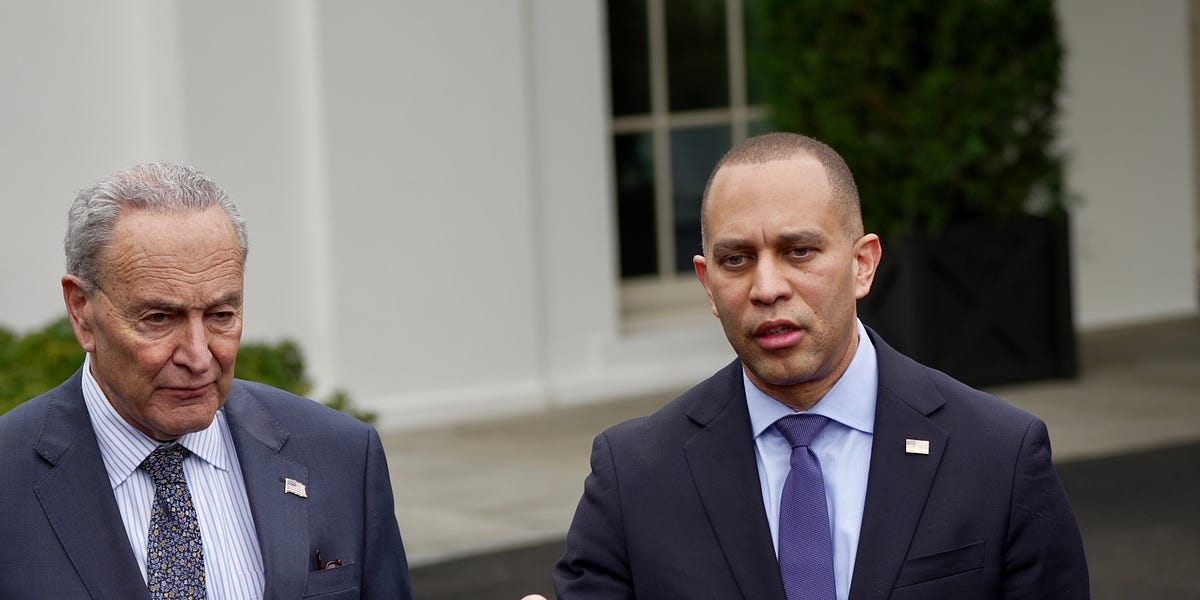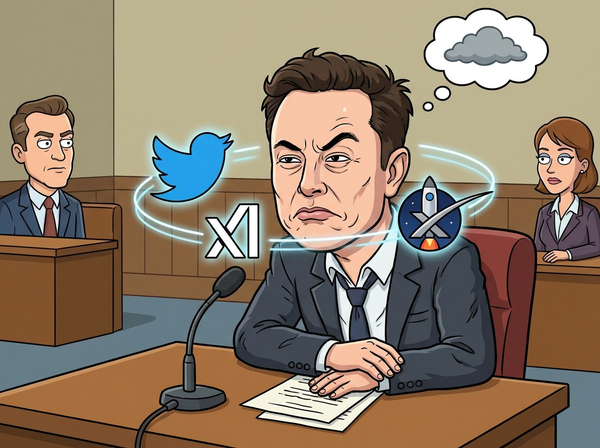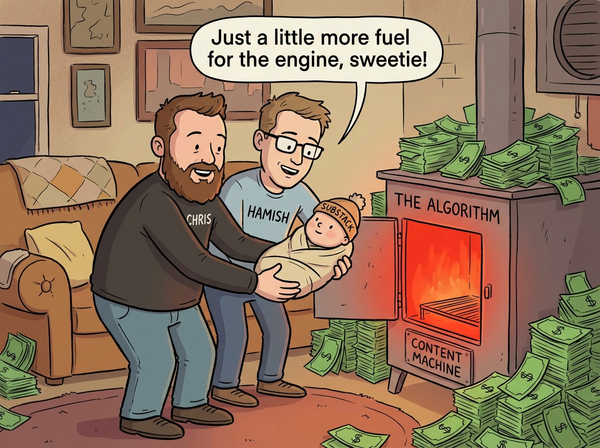The Wrong Lesson
After another failed election, the self-reflection of the consultant class is de riguer, and it is as cringy as ever. Decide to Win is no exception

Update: Moments after I posted this, I read a Dave Karpf post on TNR and it's amazing. See quote at the end...
It is the season for political autopsies and dissections. In 2012, after Obama thumped Mitt Romney, there was a famous study done (that a lot of the current Never Trump folks participated in) that concluded that the Republican Party was staring down the demographic cliff of their core predominately white, older population was sliding into a disabling minority. They famously decided that they needed to cater to a younger, more diverse electorate.
Of course, then came Trump, and will fuck all that inclusiveness, let's just amp up white grievance, and be done with it.
The latest is a report called "Deciding to Win" that is all the buzz. The net net is: Dems should stop talking about inclusion, gender, and social equity, and double down on the things that really matter to people, pocketbook issues: Jobs, the economy, and immigration. Yeah, I am short changing this, but since I didn't want to read 40ish pages of political consultant onanism, I asked ChatGPT to extract the salient points:
(begin AI summary)
Key Findings
- Since around 2012, the Democratic Party has shifted significantly to the left on issues and changed its priorities — putting more emphasis on climate, identity/cultural issues, democracy norms, and less on economy, cost of living, jobs.
- Voters increasingly perceive Democrats as “too liberal” and believe the party is focused on the wrong issues (e.g., many say the party doesn’t sufficiently prioritize the economy, cost of living, border security, crime) while over-emphasizing issues they view as lower priority.
- The electorate remains majority moderate or conservative on many questions: broad segments of working-class voters, non-college educated, older voters, and swing voters fall into that category.
- Within the Democratic coalition, the groups with greatest influence — campaign staffers, donors, highly educated voters, advocacy organizations — are significantly more liberal than the average voter. This helps explain the mismatch between party focus and voter priorities.
- The “mobilization” strategy — i.e., focusing primarily on energizing the base rather than persuading moderates or swing voters — is challenged. The data show moderate-candidates tend to perform better; turnout alone or “knocking doors” alone is insufficient without message and positioning.
- On issue polling: many Democratic policies are popular when defined clearly (e.g., protecting/expanding Medicare, Social Security; raising minimum wage; prescription drug price negotiation) but many other Democratic-policy proposals are unpopular (especially on immigration, crime, energy restriction, large new social programs) or suffer from low trust.
- Candidate positioning matters: the policy stances candidates choose and the way they are perceived ideologically correlate strongly with electoral outcomes. More moderate/perceived moderate candidates tend to over-perform; candidates perceived as extreme tend to underperform.
- The report critiques various explanations for Democratic losses (e.g., “we just need more social media outreach”, “we just need younger candidates”, “we just need to be more progressive”). It argues that these are insufficient alone; the core problem is agenda, prioritization, and alignment with voter concerns.
(End AI Summary - you really don't need to read all this self congratulatory tripe, this is what GenAI is good for)
I could go into all of these, but let's pick on a couple, shall we?
Number 2 from above:
Voters increasingly perceive Democrats as “too liberal” and believe the party is focused on the wrong issues (e.g., many say the party doesn’t sufficiently prioritize the economy, cost of living, border security, crime) while over-emphasizing issues they view as lower priority.
This is fair. You know why this is? It isn't just the far left loons. It is anyone to the left of Mitt Romney. And this perception is largely because starting in the 1970's, NCPAC began a Titanic sized campaign of negative attack ads targeted at Democrats first in the Senate, and then expanding. In the 1980 race, they had a hitlist of 6 Senators that they flooded the zone with just the worst shit, and it stuck. At the same time, the Religious Right was rising, and they became a behemoth that was effective at turning out voters for single issues (Abortion, defeating the ERA, and anything around homosexuals). The beloved Saint Reagan of the Right did the deed, merging the Republican party with the Moral Majority and their spawn has become a dominating force to this day.
So, 45 years of relentless assault by these forces has made Democrats the perpetual underdogs. Couple that assault with the large tent, and the factious coalition, it is a recipe for bleak.
I will spare you my vitriol on number 4 above, but instead will do a short dive into #5
On issue polling: many Democratic policies are popular when defined clearly (e.g., protecting/expanding Medicare, Social Security; raising minimum wage; prescription drug price negotiation) but many other Democratic-policy proposals are unpopular (especially on immigration, crime, energy restriction, large new social programs) or suffer from low trust.
No shit. This has always been the case. In fact when you can actually get a normal citizen to listen, and you explain these policies, they do tend to like it.
But then they go out and vote against it, because trans girls in high school swimming or some other shit.
The advisor class then says "Well, perhaps we should just toss the trans women under the bus, because we need to to win." This is usually couched in the pablum of "pivoting to the center" because moderates are so good at "winning", with perhaps a nod to "... well, we can protect these at-risk groups quietly after we are in power".
You know what that does? That gets you a second term of Trump, and the next series of MAGA candidates. You can't sell your soul (and sell out flesh and blood people) to win with some sort of a half-assed promise to fix it later.
Because if you do, you are no better than a Republican.
Ok, enough of my shit-takes on this. What spurred this was a sense of rage I had after reading and listening to a lot of Never Trump former Republicans (looking at Sarah Longwell[1] in particular) point to this to say "See, we've been telling Dems to go moderate or go broke." I woke up with a headache too damn early this AM, and after tossing and turning, I opened my iPad and browsed The Atlantic, where David Graham has a good take on this reflective piece.
Are the Democrate Overthinking this?
This article (gift link) is pretty solid and worth the read. One of the points that Mr. Graham makes is a thought to the Democrats making their own Project 2029 blueprint, a counter to The Heritage Foundation's Project 2025.
First, some history. The Heritage Foundation was established in 1974 by Paul Weyrich and it was always a Christian tinged far right conservative think tank, established to counter the left leaning think tanks that rose after the Depression.
In the last 50 years, the Heritage Foundation has had a single goal, that is to instill a right-wing ideology into the national fabric, and every 4 years they cranked out a policy report to hand to the incoming Republican (when they win) President. Mostly, their policy papers were ignored or very lightly influential in the administrations of Reagan, Bush, and Bush II. But with the election of Trump both times, the lightweights on team Trump were much more amenable to the Heritage Foundation's ministrations.
And in fact, Trump II is speed-running the implementation of Project 2025. It is estimated that 80% of their proscriptions are already fully or mostly in place, thanks in no small part to Russell Vought being installed as the head of the Office of Management and Budget.
Anyhow, Mr. Graham says:
This got my attention because I wrote a book about Project 2025. Democrats didn’t seem to understand the project during the election; their elected officials weren’t ready for Trump’s second-term blitz, even though they had two years to prepare; and now the people citing it as a political model misunderstand the authors’ goals on a basic level. Project 2025 starts with a deeply held ideology, and approaches policies and politics only as a means of turning that ideology into practice.
More concise than my discourse above, but it sets the table. Then he goes for the jugular:
By contrast, the progressive postmortems show less interest in laying out a worldview. Instead, they mostly start from the position that the Democratic Party’s central problem is tactical and electoral. Their recommendations all circle the question of how to win: Does the party need better policy solutions? Does it need to govern better when in power? Has the party allowed itself to become captured by unpopular left-wing ideas? The approach is understandable. The Democrats are deeply unpopular, including with their own voters, and the past few elections have shown an erosion of the party’s vote share with groups including young men, Black men, and Hispanic people.
And this is spot on analysis. And then he goes on to the coming "Project 2029" study group:
The group that calls itself Project 2029 focuses less on how liberal or moderate certain policies are and more on their inherent merits. Its founder, Andrei Cherny, told The New York Times that the project will gather “the best thinkers from across the spectrum” of the party, which is so disparate that it runs from the moderate Representative Marie Gluesenkamp Perez to Zohran Mamdani. In other words, Project 2029 is not just nonideological—it’s anti-ideological.
And this is why it will fail big-ly. Because it is lipstick on the pig, it doesn't address the core ideology, or the 45 years of Republican sliming all things Democrat.
His next 'graph is worth sharing:
These may be worthwhile efforts, but they bear little resemblance to Project 2025, which is not an electoral project. Project 2025 begins with an ideology—a desire to build a very traditional, male-dominated, Christian-nationalist society—and only then starts outlining which policies might bring it about. This vision is not popular, and polling last year by the Heritage Foundation, which convened Project 2025, found strong disapproval among voters in battleground states. But the authors believe deeply in their worldview, and to them, that supersedes popularity with voters.
Just having a superficial counter to Project 2025 will not help, nor will just tacking to the center and shitting all over the vulnerable groups to out anti-woke the Republicans that the Never Trump folks seem to advocate.
I mean, this is just the Democratic Establishment wanting to put lipstick on their pig, and claim they are different.
Next up, some takes by Mike Brock:
The Democratic Establishment is a Dead man Walking
A couple weeks ago, I discovered Mike Brock on Substack. He is a former Tech executive from Silicon Valley that realized that his brethren in the leadership at the Valley's tech majors were really wrong.
He writes very balanced, and nuanced pieces, so when his take on this "Decide to Win" tripe dropped, I rushed to read it:

He starts with this banger of a one-two paragraph:
Hakeem Jeffries thinks the path back to power for Democrats is focusing on “kitchen table issues,” waiting for Trump to self-destruct, and avoiding challenging Trump on his increasing constitutional violations in immigration enforcement, the deployment of military to cities. These are “distractions” and “losing issues.” It’s causing a revolt in the base.
Jeffries’ approach to politics seems to rest on the assumption that MAGA will flame out, and voters will come crawling back to the 2015 technocratic order. Which is, quite frankly, insane.
Insane indeed. I will not do more here, as I am already over 2000 words, but I do recommend reading Mike. Also the post below I highly recommend, it is how I discovered Mike, and it is worth the read:

As always, I love any comments, and thoughts you might have. Do you think that pivoting to the center, and going ultra-moderate is the path back to victory?
Update: Dave Karpf delivers GOLD
In an article that came from a Bluesky thread, Dave Karpf, he of Bret-bug Stephens fame, wrote a killer column for The New Republic. Titled "Why Centrist Democrats keep Being Wrong about Elections." From this column:
Some people never grow out of the first time they watched The West Wing—a show that inscribed a Clinton-era sensibility of how professional political operatives navigate and transform the world. Many of those people decide to get into politics. That doesn’t mean we need to listen to them, though. It is 2025, and there is an authoritarian literally bulldozing the White House. He is sending masked goons to arrest people in the streets. He is letting his own criminal supporters out of prison, while sending the Justice Department against his perceived opponents. The current regime’s commitment to democracy itself is practically nonexistent. If the Democrats lose the next election, it will not be because their Republican opponents seemed like the more centrist option.
We should be clear-eyed about this moment. We didn’t get here because Democrats failed to talk about “kitchen-table issues” on the campaign trail. We got here because Democrats believed talking about kitchen-table issues was the only thing they needed to do.
Totally worth reading.
1 - Sarah Longwell is especially proud of her contribution to this report, and she continues to flag for her favorite Dem, Josh Shapiro as the 2028 candidate of choice.






